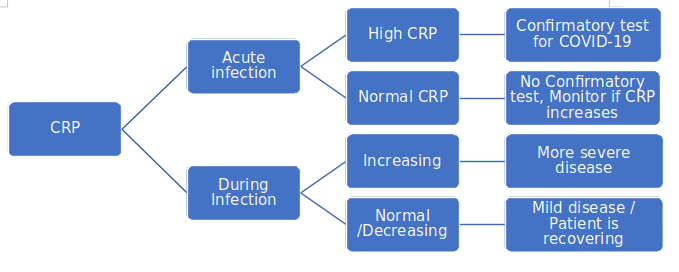
What is CRP or C-Reactive Protein? What is the role of CRP in Covid-19 diagnostics? Why is the test done? Everything around this, that you should know, in this post and of course our doctors always there to help you. Just fill in your details in the form down below and we will answer all your questions for FREE!
CRP or C-reactive protein is a compound produced by our liver in response to inflammation in the body. As per standards, CRP levels below 8 mg/dL of blood are normal.
C-reactive protein (CRP) is one of the key markers needed to diagnose and to evaluate the severity of infection, prognostics, and monitoring the course of COVID-19 disease.
CRP is especially used for early-phase screening. CRP higher concentrations during COVID 19 are often related to the severity of the disease.
In clinics/hospitals, every single patient that comes with fever and other suspected symptoms will be first checked with CRP and whole blood cell count. These routine tests will help to differentiate a common cold from COVID-19. C-reactive protein (CRP) is also monitored during the treatment together with other biochemical markers throughout the whole treatment and recovery process.

CRP levels increase significantly to appr. 30-50 mg/l during COVID-19 in contrary to the mild viral respiratory infections where CRP does not normally elevate.
High CRP along with increased white blood cell (WBC) count, elevated serum ALT and AST levels, LDH and, ferritin levels and decreased lymphocyte and platelet counts have been associated with greater disease severity and hospitalization in COVID-19 patients compared to those with the non-severe disease.
The elevated white blood cell and CRP levels in severe COVID-19 patients may reflect accompanying bacterial infection.
CRP is a non-specific biomarker of inflammation, infection, and tissue injury. It supports the clinical picture.
CRP became detectable within Six to Eight hours of the initial stimulus.
Its levels peak at 48 hours – when symptom starts to appear.
Levels decrease when patient’s inflammatory stimulus ends, and the patient is healing.
CRP correlates well with the severity of the symptoms of respiratory infection patients with COVID-19 and therefore helps in the assessment of the patient´s condition together with other clinical findings.
For more information, you can visit ScienceDirect and NCBI.
We have a strong web presence all across the globe with patients in major countries like United States, Australia, United Arab Emirates, Canada, United Kingdom, most European countries, & even smaller counties like Uganda, Nepal, Bangladesh and many more.
We have a very efficient team of doctors which includes the right combination of highly experienced doctors and the doctors of the new age.
Our main aim is to make the patient comfortable so that the case can be taken with ease and the patient be treated properly.
** The text on this website is sourced from websites like emedicine and/or other verified material by government agencies around the globe along with valuable inputs and additions by our team. The content of this page is proofread and updated by the team of doctors, every once in a while, to provide the most accurate information.